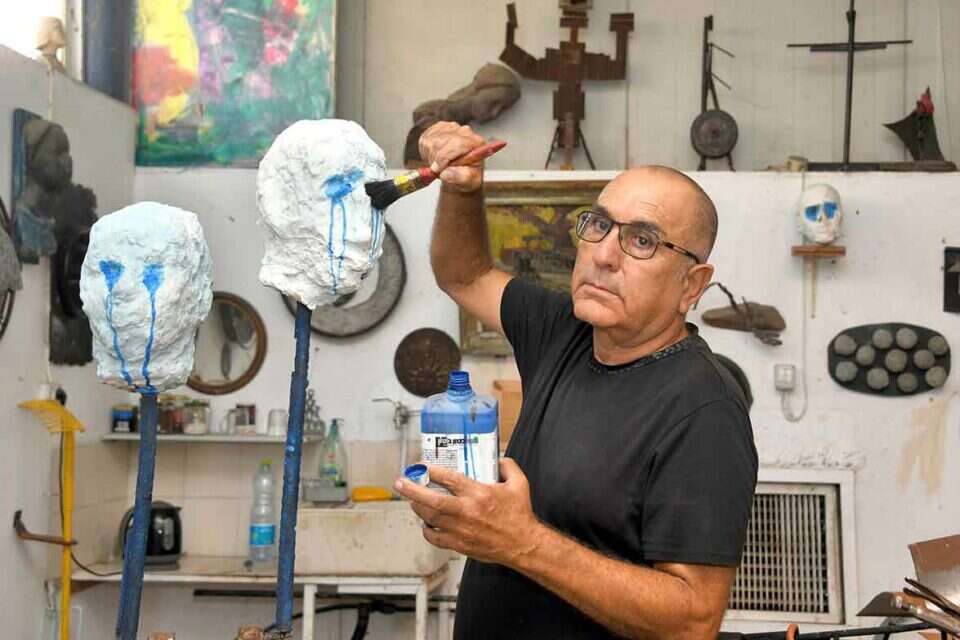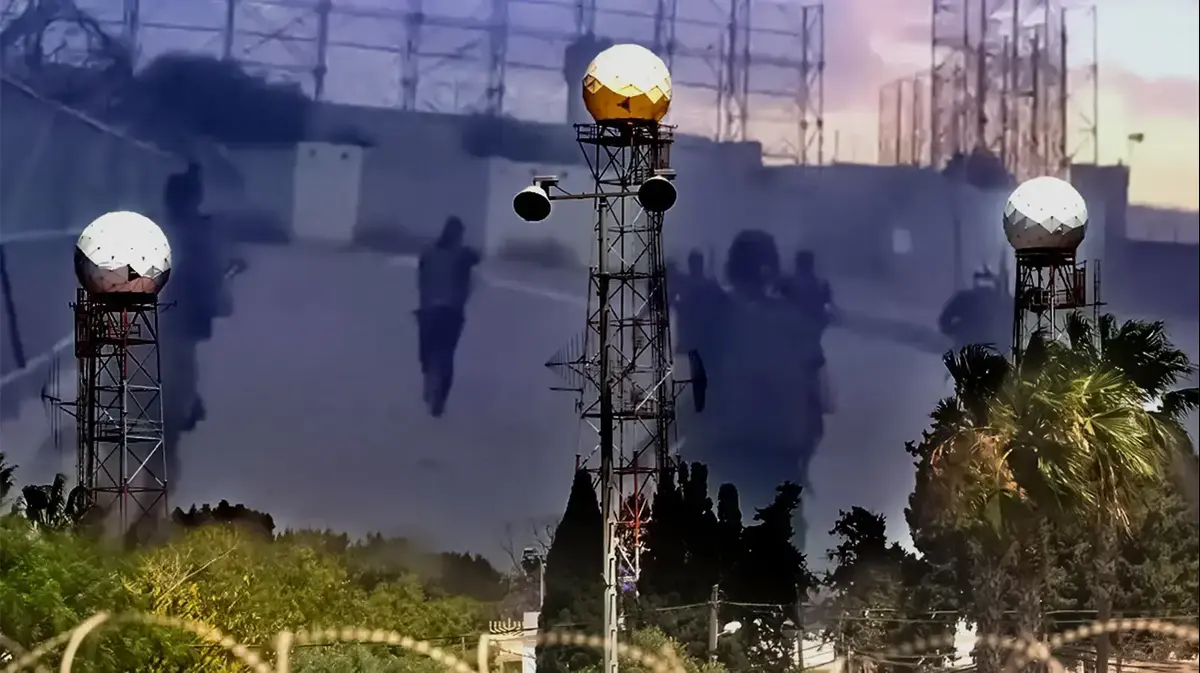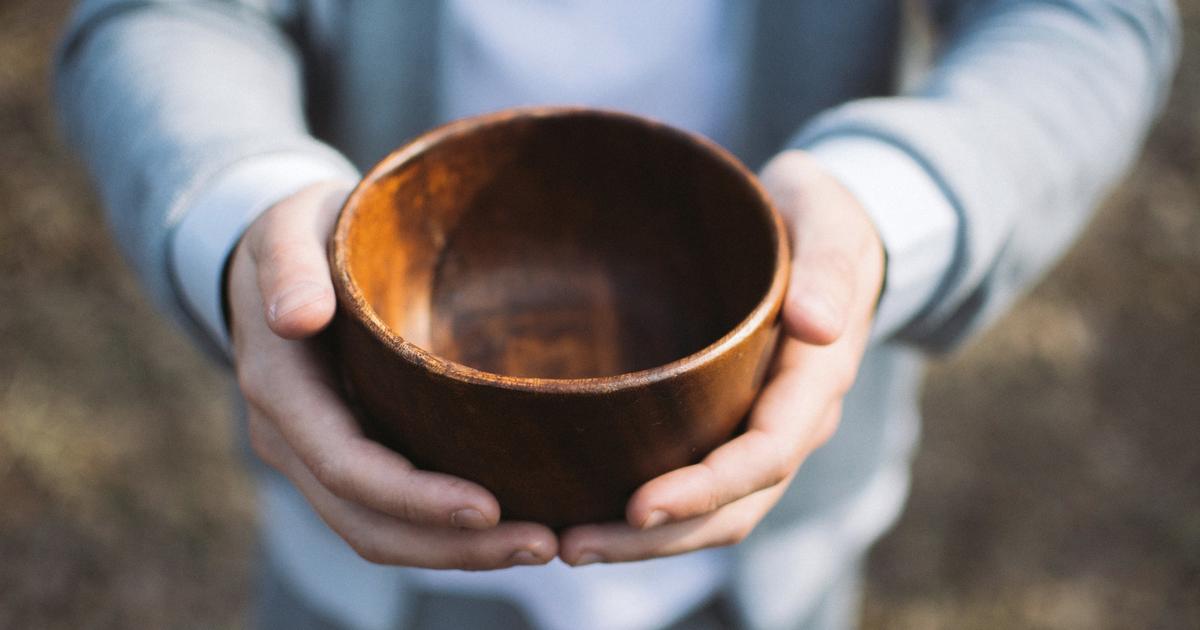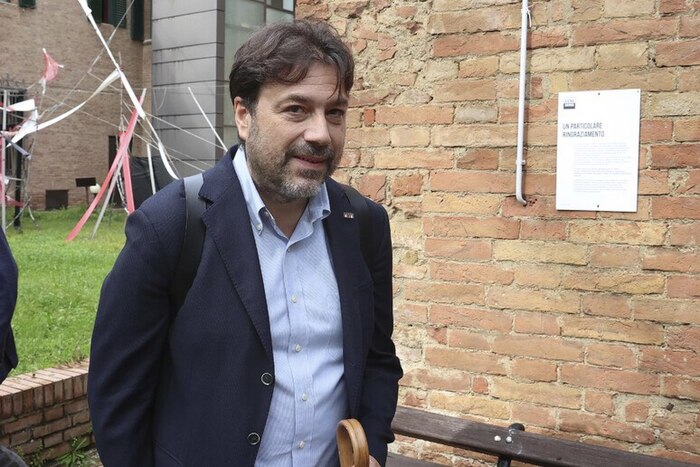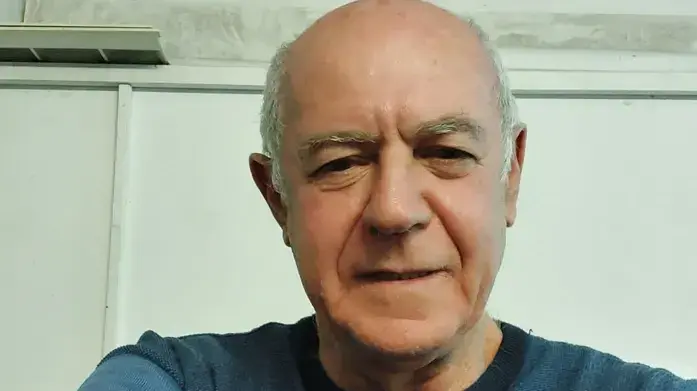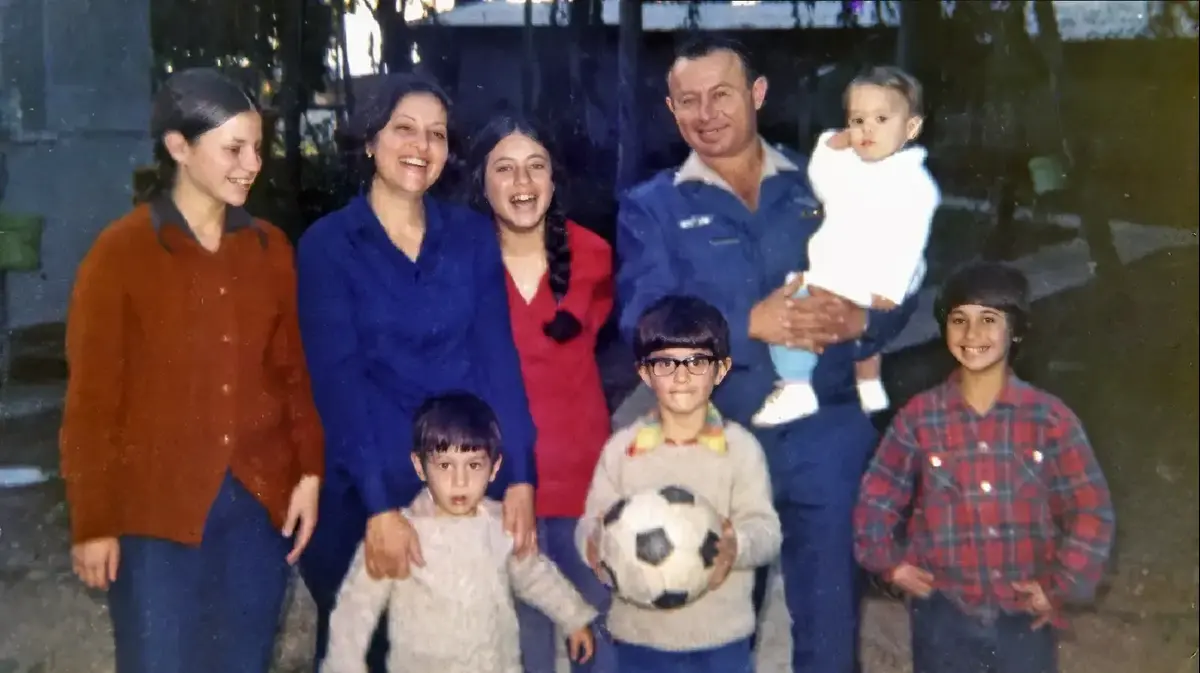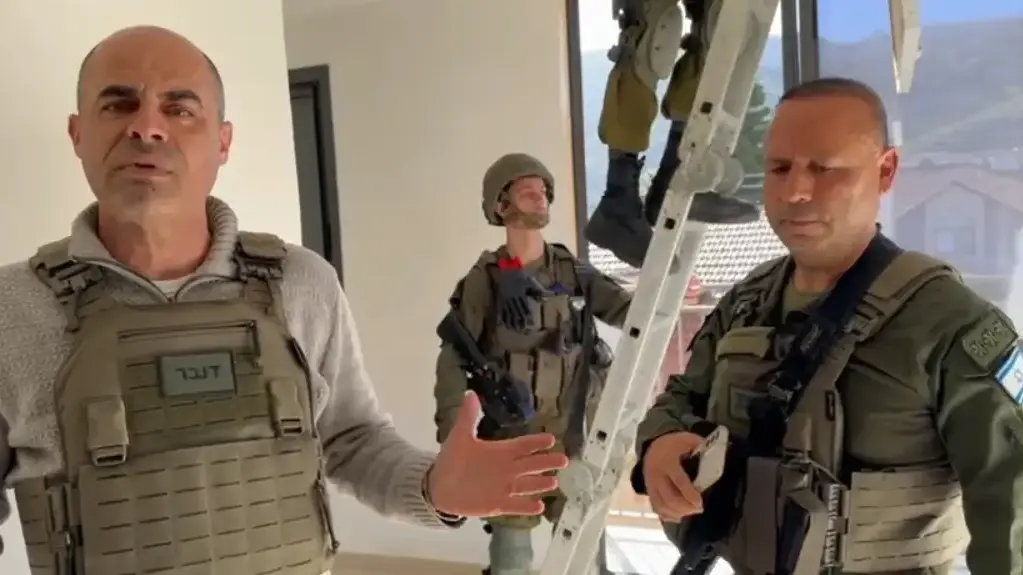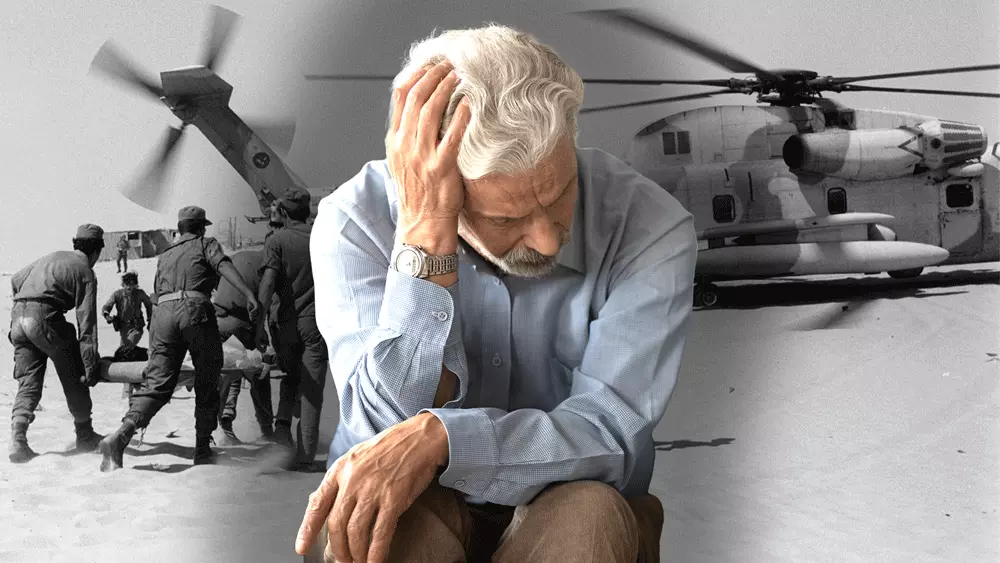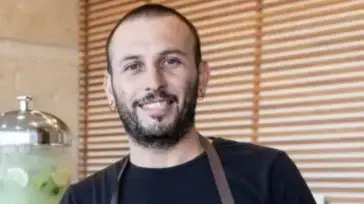If you are driving on Highway 90, on your way to the Dead Sea or Eilat, take a look at what is happening on the sides of the road and you will discover a different kind of gallery. Dozens of outdoor sculptures by the artist Yoel Ziv (68) are scattered on the sides of the road, in what he calls an "open gallery" on the Arava road, an expression of the creativity of those who live in Kibbutz Kalia in the Dead Sea Scrolls Regional Council.
The large iron sculptures, which sprout from the sides of the road, are not only art for Ziv, a man who 30 years ago decided that this is what he is doing in his life, but also a way to express his passions, anger, passions, thoughts and everything that has been repressed in him for years, since the Yom Kippur war, where he fought and almost lost his life.
He is one of the few who survived the inferno from his company, but this small victory on the battlefield was accompanied over the years by a difficult struggle, with thoughts that he did not share with anyone, with daily difficulty expressing, crying, or even talking about what happened there.
Now he is preparing to place a new sculpture that he created inspired by a collection of poems written by the poet Haim Guri following the Yom Kippur War.
The statue, which is a huge iron seal weighing 400 kg and was placed before Yom Kippur, will welcome those who come to the Dead Sea and tell them the story of Joel's war, the war of all of us.
The large iron sculptures, photo: Efrat Eshel
"Haim Guri published the book of poems 'Ad Ko Nesher'. He fought in the war, and with his good tongue and pointed head he wrote very interesting poems about the war, and inspired by this poem and the entire book, I suddenly came up with the iron statue," explains Ziv.
"I don't think much in advance when I sculpt, I don't plan it, and these are usually things that come out of me. My head is full of characters and images, my archive is full (laughs). I don't look for inspiration in things I see or hear, everything is in a box, there is I have many images in my head. I keep this statue in my studio, and on Yom Kippur I want to put it on Route 90, it will stand on a 12-meter-high column."
Yoel Ziv was born in 1953 in Jerusalem, where he grew up until his military service.
Upon his release he flew to the USA, where he met his wife, originally from the Netherlands, and together the two of them moved to live in the Netherlands for four years, where their two daughters were also born. The wanderings, which in retrospect will be regarded as an escape, continued on the journey in the trailer that the couple made towards the country with the girls, They arrived here in 1982, and here too they continued to move around in a trailer.
"I made all my bronze sculptures from wax", photo: Efrat Eshel
"At that time we still had Sinai, so we plowed the land from Sinai to the Golan Heights, we reached the Moshav Bekaot in the Jordan Valley, we moved to the Moshav Nativ HaGodon and then we arrived in Kalia, 30 years ago. On the way, two more daughters were born. After we arrived at the kibbutz, I got divorced, and 20 years ago I got married Today I live with my wife in Kalia, where my ex-wife, children and grandchildren also live."
There are three of us left
He doesn't usually talk about the war, he doesn't remember parts of what was there, other parts he would rather forget, but when I ask him to try to return to those moments, despite the difficulty, he stays silent for a moment and then shares.
"When the war broke out, I was 19 years old, I served in the armor, in the 217th brigade. Our brigade was called Netka, and when the war broke out, we went down towards Sinai.
"We were in a big panic, there was a lot of confusion, I didn't understand where I was going, I was an innocent child, one who didn't understand at all where he was going. I was part of the contact company, our brigade was sitting in Kiryat Malachi, and during the journey to Sinai we were bombarded along the way full of bombs from Egyptian planes. Slowly people around me disappeared, a good friend of mine remained next to me, and then the real movie started - the horror movie.
"We arrived at the Suez Canal, crossed the canal and entered Egypt. I really don't remember anything from what happened there. To this day I am in good contact with my MP and the friend who was next to me.
Only the three of us remained.
Today we talk occasionally, but even in our conversations we never went into details, we didn't talk about what was really there.
We didn't ask questions.
It's as if there is repression around this topic, or maybe even shame."
Why shame?
"I don't know, maybe it's the thought that we survived and the others didn't. I don't know how to explain it, but the fact is that it's a topic I've never discussed with my family. About a year ago, they came from television to interview me, and there I agreed to tell a little, really a little, and when my daughters They saw the article and they were shocked. It's not a subject that's ever been discussed in our house. I think I'm really a little ashamed to talk about it, I really don't like talking about it, and the truth is that it's very difficult for me, because I saw there, in the war, very things difficult".
"The treatment of fighters and dealing with battle shock is a subject that is very much talked about today", photo: Efrat Eshel
And how did the three of you actually survive on the battlefield, what saved you?
"Some will say that it was the hand of fate, I don't know. Understand, I wasn't on the front line, we were in the brigade's liaison company, which basically means that we were in eye contact with the battle itself, we watched it, we sat where the brigadier sat, the , all the top brass, and from there they conducted the war. We sat with them and heard everything and saw everything. I remember people shouting for help on the phone, confused soldiers who don't know what to do, those who shout that they have no equipment, no one to turn to, no ammunition."
without prior preparation
Almost in an instant, the lives of Yoel and his friends were turned upside down, just like the lives of an entire country were turned upside down in the fall of 1973. Thousands of fighters were killed on both fronts, in the Sinai and the Golan, and many thousands more were wounded, some physically and mentally.
Ziv's sculptures, photo: Efrat Eshel
It sounds like this memory is still burned into you, that these images feel alive and present.
"When I want to return to these images, in a second I see them. I have a series of images running before my eyes, images of people dying next to me, of corpses being thrown next to me, these are very difficult things, and none of this was with any preparation, yes? I wasn't ready for it , I had never seen a drop of blood before - and suddenly this thing came, without any preparation, and everything happened so quickly. It was very difficult."
Were there moments when you thought you wouldn't survive, that you believed it was the end?
"The whole time, the only thought was that this was the end. You see bombs and artillery in front of you, you understand what is happening in the field, slowly the people around disappear, and you finally see that you are actually alone. They started bringing us people to be with us from other places, people I didn't know, from other units, from other companies, so I find myself with people I don't know. My MP was also someone who was brought in while fighting, he is not the MP we went into battle with, he came to us during the war and was with me all the way, until Today we are in good contact. In fact, there are three people left from my entire company."
Ziv (right) with his comrades at the end of the Yom Kippur War,
Do you remember how it ended? How did you get out of there? where did you go
"I don't remember anything, I don't remember the end, neither how it ended nor where we went, I have a serious blackout from the end of it. Do you understand that I am a soldier who does not know where he fought? A few years ago a book was published about our brigade, I received the book home And I never opened it. Until today."
The treatment of soldiers and dealing with battle shock is a subject that is much talked about today. I guess it was really not acceptable then. Did you get to talk to anyone? go to therapy?
"At that time it was really not acceptable, they didn't understand what it was. It's as if they're telling you: You saw what you saw. Come on, drink a glass of water and go on with your life. Like nothing. Today, in retrospect, when I look back on my life I understand why I was always on the run , I was constantly running away. I went abroad immediately after the liberation, and it was as if I was constantly in pursuit, constantly restless, with fears, with things I did not know before, and on the basis of these things I actually built my personality, the person I am being built within For these years.
After all, it was an age when a person is just starting to build his life, and I chose the direction of escape, even if at that moment I didn't understand it."
Ziv (center) in his military service,
Healing in sculpture
He did not study sculpture, he was not a child who painted or sculpted at home, and in fact he only came to the world of art 30 years ago when he finally stopped his life's wanderings and settled in Israel.
Over the years, art has become not only an expression of his creation but also, and perhaps above all, a real therapeutic act.
"The truth is that art came into my life in a serious way 30 years ago. It started when I came to the kibbutz. After so many years I suddenly had a house and settled in it, and then I actually started creating things. I never did art at a young age, but I think that as soon as I came to the kibbutz something I calmed down, suddenly I had a house. I also got divorced there. We are divorced and on good terms, very good friends, but the breakup is something that had to happen, we had to separate forces. So I found myself at home alone, and suddenly things started to come out. I didn't make sketches of sculptures, I didn't plan what I was doing, to this day I don't think about what I'm doing or aim for a specific figure. I have a studio that I go into in the morning, and then things come out.
"I think that what I am going through today is a kind of process", photo: Efrat Eshel
"I started working in bronze at all, in the first years, when there it's a completely different process. First of all sculpting in wax. I made all my bronze sculptures from wax, and I cast them in the foundry in Beit Nakofa, at a friend's house. I started casting the sculptures and while casting I started working there. I worked At the foundry for four years while I was living in a kibbutz. I would travel every day and I sculpted mostly figures of people and animals. I usually sculpt figures of people and animals, many masks, sculptures of difficult creatures. I think that my sculptures are not ordinary sculptures, these are not Easy works, I create difficult characters."
Where does it come from?
Could it be that the experience that was burned in you in the Yom Kippur War and was never processed or treated properly is reflected in the difficult sculptures you sculpt?
"I have no doubt that it is related. I think that what I am going through today is a kind of process. A long process that I have been going through for many years. This art, sculpture and creation are the things that gave me calm, that allowed me to truly express myself, that allowed me to get things out of myself This aggression can come out of me today in the form of sculptures, through art."
And how did the idea of scattering the statues along the Arava road come about?
"Basically, the idea is that everyone who passes by Route 90, the central axis of the State of Israel between the south and the north of the country that runs between Eilat and Kiryat Shmona, will see the sculptures. At first I actually set up a gallery in the wild on a date plantation of Kibbutz Kalia. I even got the support of the head of the council, who He gave me a grant to continue creating. There are a lot of my sculptures that are placed in the kibbutz. When I accumulated close to 200 sculptures, I placed them in the grove, and today there is a real sculpture garden there. We had a festive opening with musicians and music and it was really fun."
You no longer work in bronze, you have moved to iron.
"True, first of all the process of sculpting in bronze is difficult and very expensive, the sculptures themselves are very expensive, so about ten years ago I stopped. Today my bronze sculptures are placed on the cliff coast and in the 'Eshel' gallery in Herzliya. From there I moved on to creating in concrete. I worked with him for several years, and there Today I have a lot of concrete sculptures. Then, after five years, I switched to iron. I collect and collect the iron in all kinds of ways, there are contractors who give me scraps that are left over, I have a cart and I go around with it and collect from all kinds of places."
He entered the world of art only 30 years ago, photo: Efrat Eshel
the sad clown
The many years that have passed since the war have not eased Ziv's trauma, perhaps on the contrary.
Next to the art itself, it is impossible not to consider the therapeutic aspect of your work.
I wonder if after all these years, and creating with the changing raw materials, today you managed to reach a more complete place.
Are you reconciled with the ordeal you went through?
"I'll answer you honestly - I don't feel whole or reconciled, I feel like I'm stuck, that I have something that sticks in me and makes me feel suffocated. I have moments and places where I just want to scream and cry, let out a huge cry, but everything is stopped inside. I'm not a person who cries, and the truth is that I've never cried since the war. I'm dying to cry and get it out, but it's stuck tight. When I hear about car accidents or sad things in the news, about disasters, and I feel that the crying will come out - immediately I choke and swallow saliva and it passes It's very difficult to live like this."
Have you thought about trying to go to therapy? Maybe after all these years you will be able to deal with the trauma with therapy.
"I don't like to tell you, and it will sound a bit strange, but I enjoy the depression," he laughs, then explains his intention: "This depression is something I've gotten used to, it's a part of me and I use it for my creation and my work, and also for my humor. I feel And all my humor comes from that, being such a sad clown.
Yoel Ziv, photo: Efrat Eshel
"Everyone knows me as the guys' entertainer, the happy clown, the one who makes everyone happy, but the people closest to me really know me better and know that although on the outside I'm the guys' funnyman, there are other layers and other things that not everyone knows. You're right that it needs to be taken care of , but I think today I've already gotten used to it, and maybe I don't feel like changing myself right now."
Is there another dream to fulfill? Show in a certain gallery? Work with a well-known artist?
"I used to have all kinds of dreams, but today I feel like I'm fulfilling all my dreams. I have sculptures that are mine, and I do what I want with them, I place them where I want, and everyone sees them. I don't have an art curator who visits me or who tells me not to do this and that, I'm a free person. I live in a free place, in a free area, and today I feel I can do anything."
were we wrong
We will fix it!
If you found an error in the article, we would appreciate it if you shared it with us

